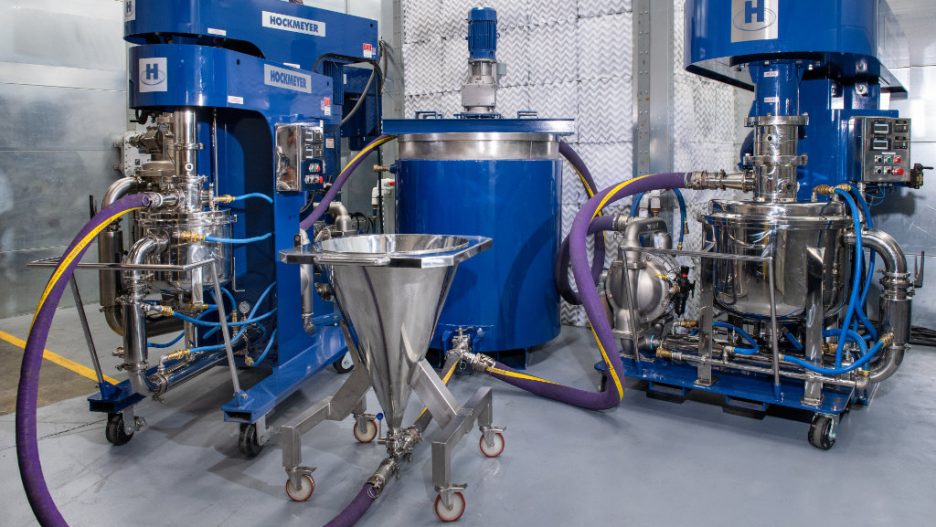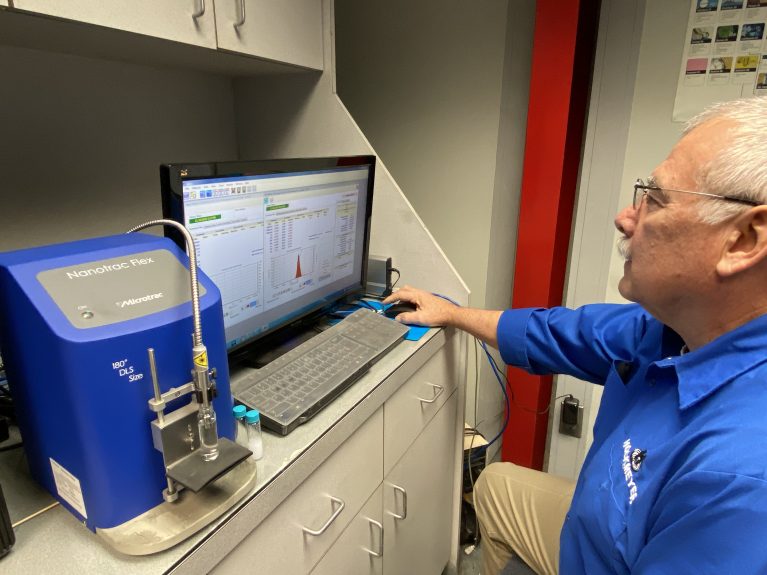
Dispersers and Immersion Mills
Customizing Mixers, Dispersers, and Basket Mills for Niche Applications
Milling and mixing technologies, including basket mills, rotor-stators, and high-speed dispersers, play a crucial role in manufacturing processes across various industries. For certain applications, standard models are more than sufficient. In some cases, however, these “off-the-shelf” solutions cannot meet the exacting demands of specialty formulations. Manufacturing companies in industries such as paints and coatings, inks, biomedical science, renewable energy, and personal care often rely instead on custom mills and dispersers to meet their needs.
Choosing a custom basket mill or high-speed disperser ensures precise control over particle size and consistent output quality across batches. These tailored solutions can reduce processing cycle times, lower energy consumption, and increase throughput, ultimately leading to enhanced productivity and profitability.
As a world-leading supplier of milling and mixing equipment, Hockmeyer has been providing custom dispersers and basket mills for clients for decades. We often hear from engineering and procurement leaders that our bespoke solutions translate to faster time to market, higher and consistent product quality, and reduced waste.
Characteristics and Challenges in Immersion Milling
Basket milling, also known as immersion milling, can present several challenges to manufacturers. Depending on the materials you are working with, quantities, and processing times, you may need to troubleshoot various problems to optimize your processes, maximize efficiency, and achieve the desired product quality.
Agglomeration, a common problem in immersion milling, can be a source of frustration for manufacturers. It slows down processing, creates bottlenecks, hinders flow, and alters the properties of the finished product. However, with the right custom solutions, these challenges can be effectively managed, providing a sense of relief and reassurance.
Agglomerates can sometimes be identified with a simple visual inspection of your output. In other cases, techniques such as imaging microscopy can find them.
Thermal sensitivity is another common issue in immersion milling. For many materials, temperature is a crucial factor in the manufacturing process. Imperfect temperatures can damage raw materials, causing them to break down. This can reduce the final product quality and may even present a safety hazard.
High thermal sensitivity and poor temperature control can result in localized “hot spots” during the mixing & dispersion process. This means that different parts of the mixture will behave differently and may create unacceptable variations in the finished product. It can also cause damage to the equipment, accelerating wear and tear and increasing the risk of breakdowns.
Customizing Dispersers and Basket Mills: The Fundamentals
Many Hockmeyer machines, including immersion mills, high-viscosity mixers, dispersers, and agitators, can be customized to meet specific requirements. We work closely with each customer to determine their unique processes and needs and then recommend bespoke systems to meet those needs.
In this section, we will explore the key design variables that can be applied to Hockmeyer milling, mixing, and dispersing machines.
Key Design Variables
Many of our machines and their components can be constructed from your choice of materials. 304 stainless steel, 316 stainless steel, and carbon steel are the primary materials we typically use, each offering different properties and performance benefits.
In our high-shear mixers, we can customize the exact geometry of your rotor-stator, adjusting elements such as the tip speed and shear zone clearance to your specifications.
Power density, or the amount of power output per unit volume, can play an essential role in achieving target particle sizes (e.g., D50 < 5 µm). All of our machines can be calibrated with custom kW/L ratios to meet your needs.
Cooling and heating jackets can be added to many of our machines to enhance temperature control and optimize the processing of thermally sensitive media.
Finally, in some machines, components such as seals and bearings can be customized to further improve the machine’s performance or meet a specific use case.
Tailored Solutions: Case Studies and Applications
At Hockmeyer, we are proud to serve customers across a wide range of industries, each with its own specific processing needs and unique challenges. Our extensive range of customization options enables us to provide tailored solutions that not only solve complex client challenges but also instill a sense of confidence in the effectiveness of our solutions.
In this section, we will share two real client case studies as examples of the kinds of problems our custom immersion milling and basket milling machines can solve. These success stories are not just examples, but also sources of inspiration for potential clients, showing them what is possible with our custom solutions.
Case Study A: Cosmetic-Grade Emulsions
Our client, a manufacturer in the cosmetics industry, was experiencing issues with coarse dispersion outputs and accelerated wear of screens. These issues seriously hindered the client’s product quality, often rendering batches unusable and requiring rework.
We ultimately solved the problem by providing custom screens with liners to smooth the media’s path through the mill. As a result, the custom mill now operates more efficiently. This resulted in a 20% processing cycle time reduction and led to the desired < 2 µm particle size while reducing the screen wear.
Case Study B: Automotive Paints Pigment Dispersion
This client, a manufacturer of automotive paints, sought to optimize their pigment color development, resulting in more vibrant shades for their finished products. They were also experiencing a high turnaround time for cleaning and were seeking a process optimization solution to reduce the time between batches and enable greater productivity.
We supplied this client with custom screens and pegs for the basket mill, as well as a CMX-200 tank washer to ensure the consistent availability of clean processing tanks. This case demonstrates how our custom solutions can address specific challenges and improve overall operations, leading to a significant return on investment.
Process Optimization: Efficiency Gains and Cost-Saving Strategies
Robust process optimization can yield significant benefits for manufacturers, and investing in custom machinery is often one of the most effective ways to enhance processes, increase efficiency, and reduce costs. In this section, we will show you how choosing and investing in the right tools can make a significant difference in your operations.
Process Efficiency
All manufacturing processes work slightly differently. Variables such as media type, large vs. small batch sizes, and desired output properties can all play a role in determining the best equipment configuration for your needs.
For example, many of our clients report that our dispersers and rotor-stators can efficiently enhance the pre-mix dispersion phase, thereby preparing the batch for optimal milling. The multi-stage dispersion strategies, which incorporate a consistent premix followed by fine milling, ensure uniform and consistent product quality.
Additionally, many of our machines can be equipped with custom, programmable controls. These automations free up your employees to focus on other tasks and minimize errors caused by operator input.
Supply Chain Cost Impacts
The right custom milling and dispersion machines can reduce energy bills by incorporating components such as insulated jackets and variable-frequency drives, thereby optimizing energy usage and minimizing wasted power.
Custom machines can also decrease product wastage and scrap. Process optimization and consistent production minimize off-spec output (i.e., anything that does not meet your standards), thereby reducing the need for rework or disposal of unusable products.
Implementation and Best Practices
Investing in a custom milling or dispersion machine is a significant financial commitment. Therefore, it is essential to understand not only the customization process but also best practices that can enable you to enjoy the maximum possible benefits from your new equipment. We prioritize customer satisfaction, and our customization process is designed to support you and make your life easier every step of the way.
Scoping the Project
The first step of any customization project is scoping. We will work closely with your team to understand your products, processes, and unique business needs, as well as any pain points that you wish to address.
At this stage, we will work with you to define your target particle size and size distribution (PSD) metrics, as well as any other specifications such as color, gloss, jetness, viscosity, and Thixotropic index of your finished product.
We offer free pilot testing at the Hockmeyer Applications Lab, allowing you to validate that our equipment meets your needs before committing to a purchase. This is also an opportunity for us to identify any inefficiencies or areas for improvement before we finalize the details of your machine.
Commissioning and Start-Up
Once you have purchased your machine, we will build according to the agreed-upon specifications. Our team members collaborate with your technical team to develop a comprehensive installation checklist that includes verifying the machine’s foundation, utilities, and safety interlocks.
We can also assist you with operator training, ensuring that your employees understand the capabilities, key parameters, and maintenance routines of your equipment, as well as empowering them to utilize all the advantages it provides fully.
Ongoing Support and Optimization
Your relationship with Hockmeyer does not end when your new machine is installed. We are committed to being your partner and optimizing your operations as part of a continuous improvement process.
We offer scheduled field service visits and performance audits at a frequency to be agreed upon with you. This allows us to help maintain your machine, ensuring it serves you well for many years to come. It also provides an opportunity to assess your operations and implement additional process optimization opportunities where applicable.
We can also offer machinery upgrades as needed, including retrofitting existing equipment and control systems, or integrating new system enhancements as your operations evolve and improve.
Hockmeyer: The World’s Leading Provider of Custom Immersion Milling, Basket Milling and Dispersion Technologies
Custom immersion milling (basket milling) and dispersion machines can provide benefits such as shorter production cycles, improved particle size distribution, energy and other cost savings, and a reduced total cost of ownership (TCO) compared to ” off-the-shelf” machines.
For over 80 years, Hockmeyer has been at the forefront of this field, continually innovating in immersion milling and dispersion technologies. We have developed numerous bespoke process optimization solutions for clients across industries, and we would love your business to be our next success story.
To learn more about the unique advantages of Hockmeyer machines, explore our range of immersion mills. If you’re interested in learning more about how our machines can make your processes more efficient and enhance the quality of your output, please contact us to schedule a custom demo and develop a detailed ROI analysis.

